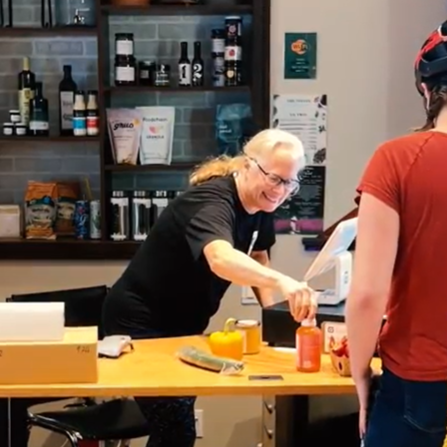Women Leading Change: Coop CAUS
In this video series, learn how a women-led cooperative is connecting growers and eaters to change the way people access food in Montreal, Quebec.
Leading Change in Community-Based Food
Coop CAUS is a non-profit solidarity cooperative helping Montrealers to eat in a healthy, sustainable and ethical way. Through farmers’ markets and a year-round general store, CAUS provides fresh, local food and farm products in an area that lacks easy access to grocery stores. Beyond just food, the cooperative supports the local economy, builds community resilience, and contributes to climate change mitigation. In this short film, meet director Tracey Arial and see how cooperatives offer a different way forward for food systems in Montreal and beyond.
Inside Coop CAUS
Coop CAUS operates as a true cooperative, with three types of members: workers, who coordinate the projects, producers, who participate in the markets, and consumers. Members buy shares in the cooperative and have a say in its democratic management. In addition to traditional outdoor farmers’ markets, the Multi-CAUS store in the borough of Verdun operates. This permanent space allows local agri-food companies to sell their products year round, and gives both consumer members and neighbourhood residents access to fruits, vegetables and products from small Quebec businesses. The cooperative also contributes to urban agriculture projects and a number of other initiatives to promote local food, education, and social connections.
Working with Open Food Network
As a non-profit and social purpose organization, the role of Open Food Network Canada is to work with local food and farming enterprises to scale fair, local, and sustainable agrifood initiatives in communities across Canada. This includes supporting and promoting social good organizations like CAUS, which recently joined the OFN platform as a new way to reach customers.
Ever since I was a kid I thought that food was important. I think it is the link between people, it’s the link to our land, and it’s the link to ethical production. I just think that if you know where your food comes from and you know who your food is produced by, then you actually have some sort of link into an ethical world. Basically community is what’s important to me and I think that community can actually fix a lot of the ecological and connection problems that we’re having right now.

Meet the Farmers & Producers
Ranging from small specialty growers to mid-sized farms, Coop CAUS’s suppliers share a common interest in sustainability, community, and high-quality food and flowers.
We’d like to introduce you to a few of them.
Aux Acres Doux
Aux Acres Doux aims to bring natural beauty into everyone’s homes, offering affordable bouquets from their small cut flower production in Godmanchester.
Ferme biologique Machabée
One of the oldest farms in Quebec, Ferme biologique Machabée produces a multitude of fresh and organic products: vegetables, herbs, maple syrup, and more.
Ferme Cavendale Farm
Ferme Cavendale is a certified organic family farm in the Eastern Townships that specializes in flavourful and nutrient-dense black garlic.
Jardin Buzz
Based in Verdun, Jardin Buzz specializes in supporting urban growers with Montreal-grown seeds, pollinator-friendly plants and design expertise.
Les Champignons Maraîchers
Les Jardins Florelia
Les Jardins Florelia is dedicated to flavour and sustainability, growing exclusively open-pollinated varieties of vegetables, herbs and flowers in Mascouche.
Les potagers des nues mains
Located on 25 hectares in Sutton, Les potagers des nues mains grows over 100 varieties of organic vegetables and fruit, with a dedication to nourish, protect and preserve the land.
About the Video Series
Open Food Network Canada is working with award-winning videographer Craig Conoley to celebrate some of the diverse small-scale distribution networks that are thriving across Canada, led by women entrepreneurs with a vision for change. In a series of short documentary films, Women Leading Change introduces the women behind these projects, profiles the farms who take part, and shows up close how short supply chains and regenerative agriculture offer solutions for the future.
Funding for this project has been provided by Agriculture and Agri-Food Canada through the AgriCommunication Program.

